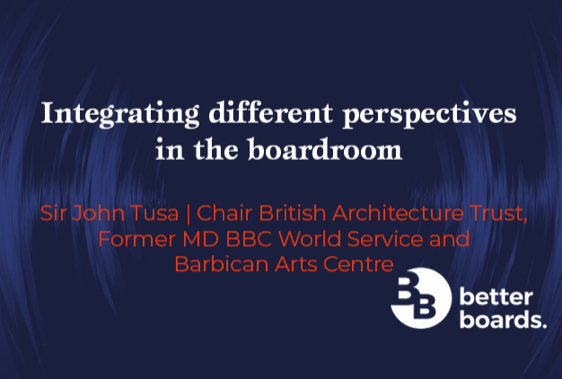Integrating different perspectives in the boardroom

The subject of this episode of the Better Boards Podcast Series is “Integrating different perspectives in the boardroom”. Sir John Tusa, presenter of BBC´s Newsnight and Managing Director of the BBC World Service, spoke with Dr Sabine Dembkowski.

There is growing awareness that we need people with different perspectives to tackle today’s challenges, however those differences can also be challenging and difficult to handle in the boardroom. Directors and board members bring diverse insights that offer value, but can often be perceived as “difficult”, “annoying”, and “hard to deal with”.
Sir John Tusa might be best known to a wider audience as the presenter of BBC´s Newsnight and the Managing Director of the BBC World Service. He was also the Managing Director of the Barbican Arts Centre and served on the boards of Cultural Institutions such as the British Museum.
Some of the key takeaways of the conversation include:
“Why bother to get together, if you’re all thinking the same thing from the start ?”
A board where everyone thinks alike might be “safe” but variety of thinking is key, and Sir John stresses the need for different perspectives, skills, characters and approaches. Boards need balance between members who are more radical and those more conservative.
“Knowing who is likely to make that decisive contribution is so important”
Sir John firmly believes that the chair needs to make it clear that contributions from every single member are expected and welcome. They should never quash discussion, lest they miss a vital resource. Chairs who fail to invite contributions are less effective than chairs who do, however, “not everybody has to say something about every subject that comes up before the board. There needs to be an economy; you can contribute without speaking the whole time.”
Referencing his time at the British Museum as a fascinating example, he describes how trustees represent a tremendous range of skills, expertise and experience, and each knows that their differing opinions and perspectives would be heard. “When you’re on the board, you are there as a full member. It’s not only the accountant who can talk about money; it’s not only the lawyer who can talk about the law.” Every board member is equal and welcome to say something about any subject, which brings constructive, different perspectives.
He recalls one member made an absolutely decisive contribution on an extremely delicate matter. “It’s knowing who is likely to make that decisive contribution that is so important.”
Never let your board drown in paper
Sir John likens chairing a board meeting to chairing a broadcast discussion. He emphasises that the Chair needs the right quantity of information, and a board should never be “swamped by paper and pseudo information.” Many (or indeed, most) board papers should go to subcommittees first, who then raise any issues with the main board. He advocates regular informal meetings between board meetings, thus avoiding surprises at main meetings. Good boards also socialise, and research shows they work better than boards meeting quarterly.
Give and gain
Being on a board both takes and deserves time and effort, but Sir John feels that being exposed to a rich mix of people you would not otherwise meet from different disciplines can also be an enormous learning experience, “It’s hard work but you learn, and if you socialise, it is also fun – as it should be.”
Don’t forget to subscribe never to miss an episode of the Better Boards Podcast Series. Available on Apple, Spotify or Google.
To find out how you can participate in the Better Boards Podcast Series or more information on Better Boards’ board evaluation software, please email us at info@better-boards.com.




